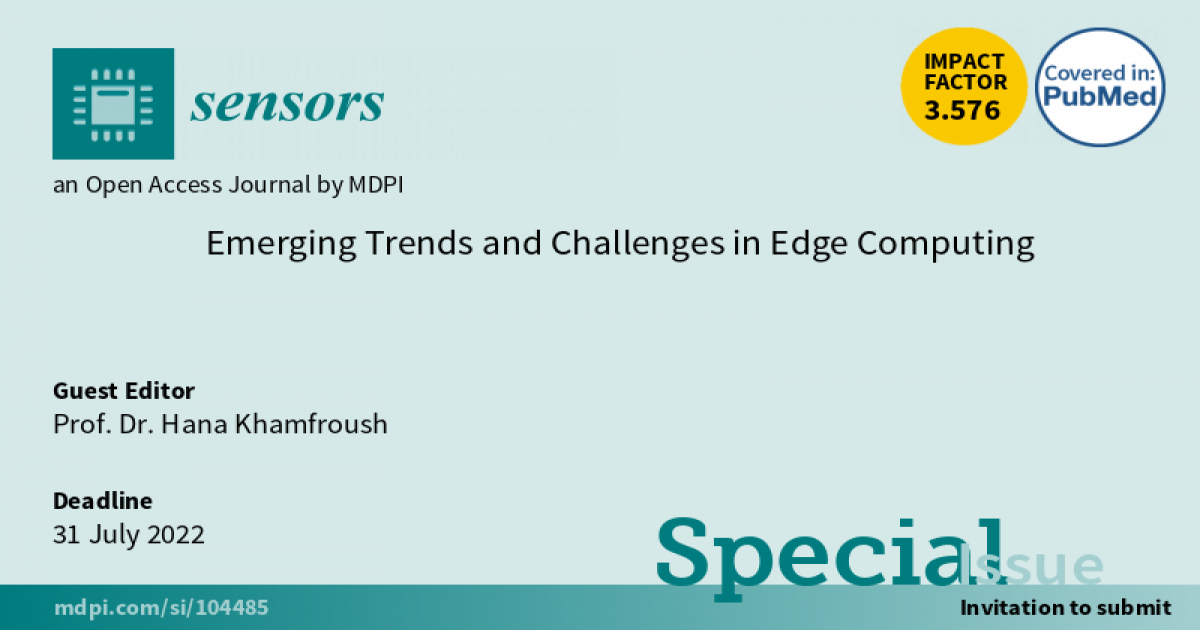Emerging Trends and Challenges in Edge Computing
A special issue of Sensors (ISSN 1424-8220). This special issue belongs to the section "Communications".
Deadline for manuscript submissions: closed (31 July 2022) | Viewed by 480

Special Issue Editor
Special Issue Information
Dear Colleagues,
With the rapid development of communication technologies and smart devices, there is a rapid increase in the number of connected users and the number of different applications and services which produce a high volume of data traffic. Traditional computing infrastructures rely on centralized cloud computing systems to collect and process such large data. However, given the distributed nature of the smart devices and the Internet-of-Things (IoT) applications as well as privacy and security concerns associated with the centralized cloud infrastructure, edge computing has emerged as an alternative technology for large data processing. On the other hand, machine learning and specially Deep Neural Network (DNN) models appear as popular and effective tools for processing such large amount of data and extracting useful information and predictive knowledge. Therefore, techniques to efficiently and reliably combine edge computing infrastructure and DNN models in such large environments are required. This special issue address challenges and trends related to edge computing and bringing DNN to the edge.
- Resource management in edge computing
- Edge computing for IoT
- Federated and Split learning for edge computing
- Distributed machine learning and edge computing
- Privacy and security issues for edge computing
- Machine learning model compression for IoT and edge devices
- Wireless issues in edge computing
Prof. Dr. Hana Khamfroush
Guest Editor
If you have any questions or need further information, please free to contact Special Issue Editor Larissa Zhang <larissa.zhang@mdpi.com>.
Manuscript Submission Information
Manuscripts should be submitted online at www.mdpi.com by registering and logging in to this website. Once you are registered, click here to go to the submission form. Manuscripts can be submitted until the deadline. All submissions that pass pre-check are peer-reviewed. Accepted papers will be published continuously in the journal (as soon as accepted) and will be listed together on the special issue website. Research articles, review articles as well as short communications are invited. For planned papers, a title and short abstract (about 100 words) can be sent to the Editorial Office for announcement on this website.
Submitted manuscripts should not have been published previously, nor be under consideration for publication elsewhere (except conference proceedings papers). All manuscripts are thoroughly refereed through a single-blind peer-review process. A guide for authors and other relevant information for submission of manuscripts is available on the Instructions for Authors page. Sensors is an international peer-reviewed open access semimonthly journal published by MDPI.
Please visit the Instructions for Authors page before submitting a manuscript. The Article Processing Charge (APC) for publication in this open access journal is 2600 CHF (Swiss Francs). Submitted papers should be well formatted and use good English. Authors may use MDPI's English editing service prior to publication or during author revisions.
Benefits of Publishing in a Special Issue
- Ease of navigation: Grouping papers by topic helps scholars navigate broad scope journals more efficiently.
- Greater discoverability: Special Issues support the reach and impact of scientific research. Articles in Special Issues are more discoverable and cited more frequently.
- Expansion of research network: Special Issues facilitate connections among authors, fostering scientific collaborations.
- External promotion: Articles in Special Issues are often promoted through the journal's social media, increasing their visibility.
- Reprint: MDPI Books provides the opportunity to republish successful Special Issues in book format, both online and in print.
Further information on MDPI's Special Issue policies can be found here.






